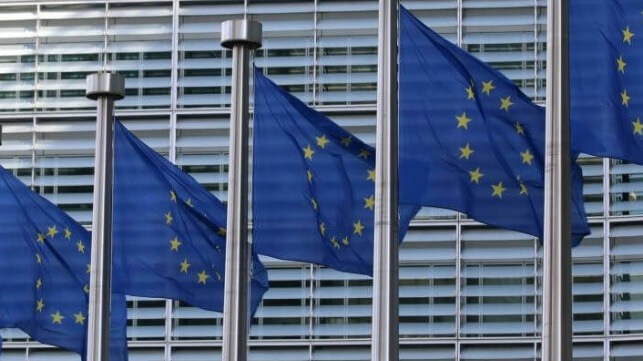EU Reaches Deal for FuelEU Maritime Rules on GHG Emissions

Political agreement was reached this morning between the co-legislators of the European Parliament and the European Council finalizing the rules for FuelEU Maritime, the trading scheme to limit carbon emissions, in what is being called the world’s most ambitious path to maritime decarbonization. The shipping industry won some final amendments which they believe will reward early adopters and encourage rapid increases in the production of green fuels under the scheme which now only requires formal adoption by the European Parliament and Council before it goes into effect.
The program lays out a pathway for the maritime industry to use an increasing amount of green fuel in the future as well as setting clear targets and incentives. All ships over 5,000 gross tons either sailing in the EU or sailing to EU ports are required to participate, which according to supporters represents ships responsible for up to 90 percent of CO2 emissions. The targets also include both methane and nitrous oxide emissions (NOx) and apply to 100 percent of energy for ships operating within the EU and 50 percent for ships sailing to or from ports outside the EU.
The limits increase gradually under the proposal starting at 2 percent as of 2025. Increasing at five-year intervals, the levels rise to 6 percent, then 14.5 percent, 31 percent, 62 percent, and finally in 2050 reach 80 percent. The agreement is a significant versus the language presented in October last year when the EU Parliament adopted its position setting the emission limits at 2 percent by 2025, 20 percent by 2035 and 80 percent by 2050, compared to the 2020 level. Earlier in July, the Commission had proposed a 13 percent reduction by 2035 and 75 percent cut by 2050. The new deal also provides for credits as an incentive through offsets to shipowners who use renewable fuels of non-biological origin (RFNBO) during the first decade of FuelEU, but it also sets a new sub-target for e-fuel calling for one percent adoption by 2030 or introduces a mandate of 2 percent for e-fuels by 2034.
The shipping community had called for incentives and ensuring that the fuel industry was also required to participate to increase the supply of e-fuels. They also said that the industry required clear targets while also calling for a gradual increase in the caps to provide time to adapt.
“First of all, it is vital that we now have an agreement on FuelEU Maritime. More than anything, the industry asks for clarity – also to create certainty for offtake for fuel suppliers,” commented Anne Steffensen, Director General and CEO of the industry trade group Danish Shipping after the EU moved to finalize the rules. “Today’s agreement on FuelEU Maritime will set the course for cutting greenhouse gas emissions from ships, increase the use of more renewable fuels, and support the maritime sector in contributing to the EU’s goal of climate neutrality by 2050.”
Danish Shipping had joined with a broad coalition calling for the inclusion of incentives into the final terms to address concerns over the supply and more expensive cost of e-fuels and rewarding companies that become first movers. They are highlighting the inclusion of a multiplier while EU legislators are noting the terms are technology-neutral allowing innovation to proceed and giving operators the freedom to decide how to meet the targets. Ships will also be allowed to pool their compliance with an averaging in the pool to meet the greenhouse gas intensity limits.
In addition to applying the rules to the energy used by ships underway, the new rules also introduce an additional zero-emission requirement at berth. They mandate the use of on-shore power or alternative zero-emission technologies by passenger ships and containerships in major EU ports as of 2030. It will apply to the remainder of EU ports as of 2035 if they have an on-shore power supply. The agreement however offers certain exemptions, such as when a ship is staying at port for less than two hours, is using its own zero-emission technology, or making a port call due to unforeseen circumstances or emergencies.

that matters most
Get the latest maritime news delivered to your inbox daily.
“Today’s decision marks the beginning of the end of dirty fuels in shipping,” said Delphine Gozillon, sustainable shipping officer at the environmental group Transport & Environment (T&E). “The EU is charting the way with the most ambitious package of green shipping laws ever adopted. This success should inspire other countries to do the same.”
While the EU’s move to adopt the FuelEU Maritime regulations has long been anticipated, it is seen as a further pressure point on shipping and other parts of the world to accelerate their efforts for decarbonization. It is also viewed as creating a further urgency for the International Maritime Organization (IMO) to move forward and set broader industry-wide initiatives. Critics have said by moving slowly the IMO is losing control of the issue ceding its authority to local politically driven initiatives lacking uniformity and the global standards required by the shipping industry.
